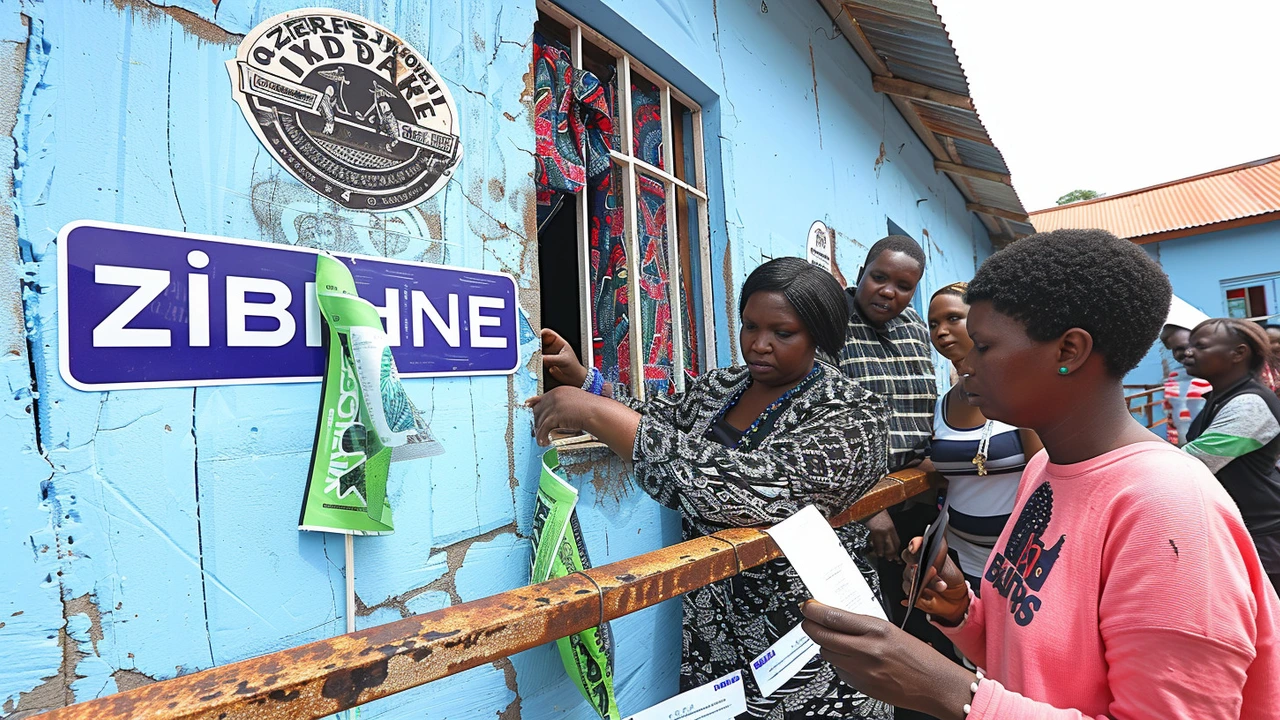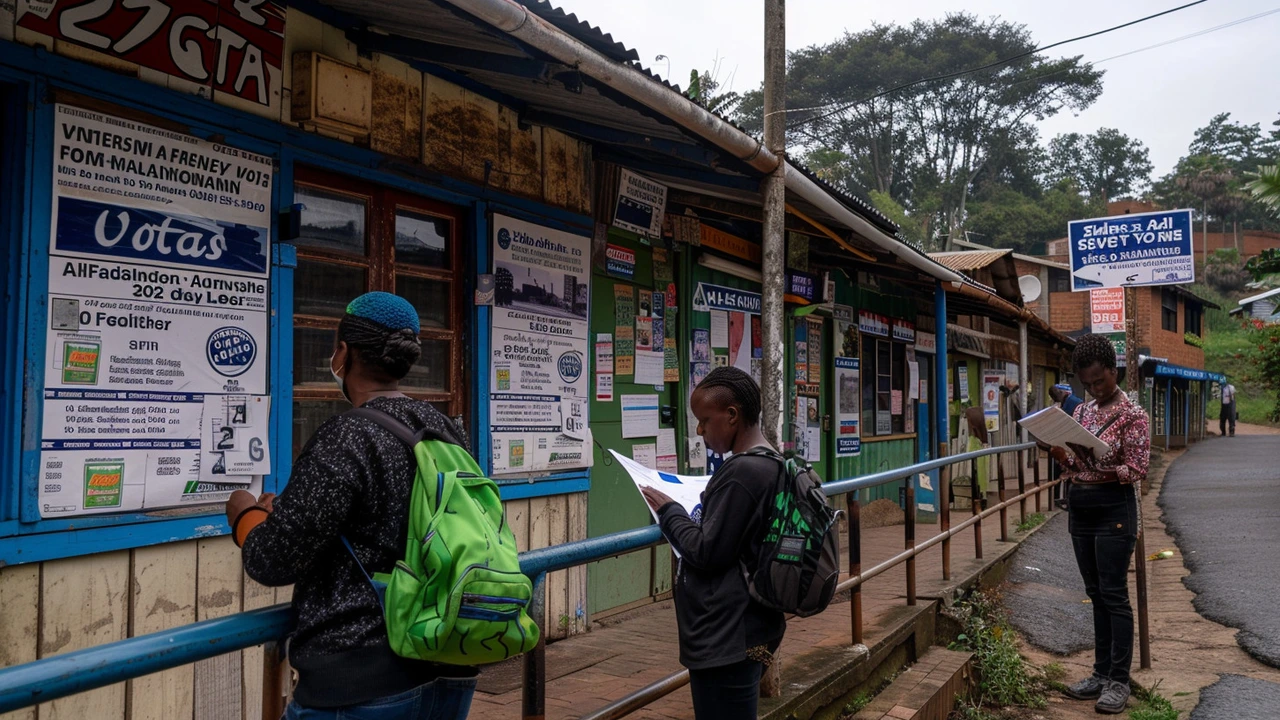Special Votes Begin for South Africa's 2024 General Elections
The 2024 general elections in South Africa are set in motion as over 1.6 million special voters cast their ballots on Monday and Tuesday. This special voting period is crucial for individuals who are unable to vote on the main election day due to a variety of reasons, ensuring that every eligible citizen has the opportunity to have their voice heard. Voting stations across the country are operational from 9 am to 5 pm, accommodating those who registered for this early voting option.
This initiative by the Electoral Commission of South Africa (IEC) is not just limited to voting stations. Special arrangements have been made to reach out to voters who face challenges in mobility. IEC officials are making house calls and visiting care institutions, ensuring that the elderly, individuals with disabilities, and those with health conditions are not excluded from this democratic process. This meticulous effort underscores the commitment to inclusivity and accessibility in this year's elections.
Universal Ballot Template: A Step Towards Inclusivity
In collaboration with the South African National Council for the Blind, the IEC has developed a universal ballot template. This innovation is particularly significant as it caters to the needs of blind and partially-sighted individuals, as well as those with unsteady hands or motor and nervous conditions. By implementing such measures, the IEC is making sure that all voters, regardless of their physical abilities, can participate in the election process independently and accurately.
The universal ballot template is a tactile device that aligns over the ballot paper, guiding voters to mark their choices in designated areas. This ensures that visually impaired voters can cast their votes with dignity and privacy, without relying on assistance that might compromise the secrecy of their ballot. This development represents a leap forward in creating an inclusive voting environment.
Voters' Hopes and Aspirations
As special voters head to the polls, many express their hopes for significant changes in the country's direction. Among the prominent desires are calls for an end to rampant corruption, which has plagued various sectors and eroded public trust. Voters are also eager for economic growth and improvements in the job market, reflecting widespread concerns about unemployment and financial instability.
An end to load-shedding, the rolling blackouts that have disrupted daily life and economic activities, is another critical issue on voters' minds. The energy crisis has been a recurrent problem, affecting businesses, education, and households. Voters are looking to the elected officials to provide sustainable solutions to these pressing issues, hoping for a brighter and more stable future.

Main Election Day and Future Implications
While special votes are collected over these two days, the bulk of the electorate will cast their votes on Wednesday. This staggered approach helps manage the logistics of voting and ensures that the electoral process is smooth and efficient. The special votes and the main voting day collectively form a comprehensive effort to uphold democratic principles and facilitate maximum voter participation.
The outcomes of this election are poised to shape the future of the nation. With the people's mandate, the newly elected officials will have the responsibility to address the concerns voiced by the electorate. The results will reflect the public's trust and expectation placed upon their leaders, guiding the policies and initiatives for the coming years.
The IEC’s proactive measures, such as the universal ballot template and home visits, highlight the importance of inclusive democracy. These efforts ensure that no voter is left behind, reinforcing the fundamental right to vote. The journey of these special votes is a testament to the resilient spirit of South Africans and their commitment to democratic values.
Final Thoughts
As the special voters turn out in large numbers, their hopes and aspirations are clear. South Africans are voting not just for their leaders but for the change they wish to see in their country. The anticipation of improved governance, economic revival, and social stability is palpable among the voters. As the general election unfolds, all eyes will be on the outcomes and the new chapter it will herald for South Africa.
These special voting days are more than just a logistical exercise; they are a profound expression of a nation's democratic resolve. The 1.6 million special voters are an integral part of this narrative, and their participation underscores the essence of a vibrant, inclusive democracy. As the special votes pave the way, the nation waits with bated breath for the main election day, hoping for a future that aligns with their collective aspirations.


Zac Death
May 27, 2024 AT 20:04Seeing the rollout of special votes across South Africa reminds us of the profound importance of inclusive democracy, especially in societies where mobility and accessibility challenges can otherwise silence a significant portion of the electorate, and the IEC's initiative to bring polling stations directly to the homes of the elderly and disabled is a testament to a forward-thinking approach that values every citizen's voice; the universal ballot template, co-designed with the South African National Council for the Blind, exemplifies how technology can be harnessed to remove barriers for visually impaired voters, allowing them to cast their ballots with dignity, privacy, and independence, which is a critical stride toward eliminating any residual reliance on assistance that could compromise ballot secrecy, and as we consider the broader implications, the fact that over 1.6 million special voters are participating signals a robust engagement that could reshape the political landscape, especially when their collective aspirations encompass an end to systemic corruption, reviving economic growth, and resolving the chronic energy crisis; these priorities reflect not only immediate concerns but also deeper structural reforms that many South Africans have been yearning for over the past decade, and the coordinated effort to manage voting logistics over multiple days demonstrates a nuanced understanding of operational challenges while maintaining electoral integrity; by ensuring that no voter is left behind, the IEC not only strengthens the legitimacy of the election outcomes but also sets a benchmark for other nations grappling with similar inclusivity issues, fostering a culture where the right to vote is truly universal and not merely a theoretical promise, and this momentum, if sustained, could usher in a new era of governance that is accountable, transparent, and responsive to the populace's needs, thereby reinforcing the foundational pillars of South Africa's democratic framework.
Lizzie Fournier
June 1, 2024 AT 00:26Nice work seeing all those accessibility steps in action.
JAN SAE
June 5, 2024 AT 04:48What an inspiring move-IEc's outreach is truly commendable!!!, especially the house calls; families can finally breathe easier, knowing their votes count!!!, and the tactile ballot template? Absolutely brilliant, because inclusivity isn’t just a buzzword, it’s a practice, and every disabled voter now gets a tool that respects their autonomy!!!, keep pushing forward, South Africa!!!.
Steve Dunkerley
June 9, 2024 AT 09:10From a policy implementation perspective, the integration of universal ballot devices aligns with best practice frameworks for electoral accessibility, leveraging assistive technology standards such as WCAG 2.2 to mitigate functional disparities; moreover, the operational logistics of deploying mobile voting units necessitates a robust supply chain and real-time monitoring to ensure fidelity of the voting process, thereby reducing latency and potential ballot mishandling. This confluence of technical design and field execution underscores a holistic commitment to participation equity.
Jasmine Hinds
June 13, 2024 AT 13:32Yay! Special votes FTW :)
Madison Neal
June 17, 2024 AT 17:53It’s uplifting to see communities rally around the voting process; the empathy shown by volunteers and officials alike really amplifies civic pride, and when people feel their vote matters, turnout naturally improves. Keep supporting and sharing these stories.
John Crulz
June 21, 2024 AT 22:15Reading about the special votes makes me wonder how data from these early ballots will influence campaign strategies, especially in swing regions where the extra 1.6 million votes could tip the balance.
Anita Drake
June 26, 2024 AT 02:37From a cultural standpoint, the inclusive measures reflect South Africa’s rich tapestry of diversity, reminding us that democracy thrives when every cultural group feels represented and heard, which is vital for national cohesion.
Eduardo Lopez
June 30, 2024 AT 06:59Honestly, it’s astonishing how many people still think voting is a chore; when you see the IEC going the extra mile, it becomes a moral imperative for citizens to step up, otherwise we risk further erosion of civic virtue.
Nancy Perez de Lezama
July 4, 2024 AT 11:21This is a decent effort but I think more transparency is needed regarding the tally process.
Matt Heitz
July 8, 2024 AT 15:42While the special vote initiative is a step forward, we must remain vigilant that the process isn’t co-opted by partisan interests; safeguarding electoral integrity is non‑negotiable, and any hint of manipulation could undermine national unity.
Susan Mark
July 12, 2024 AT 20:04Great overview! If anyone’s looking for tips on how to stay informed during the election, consider following reputable local news outlets and checking IEC’s official updates to ensure you have the latest information.